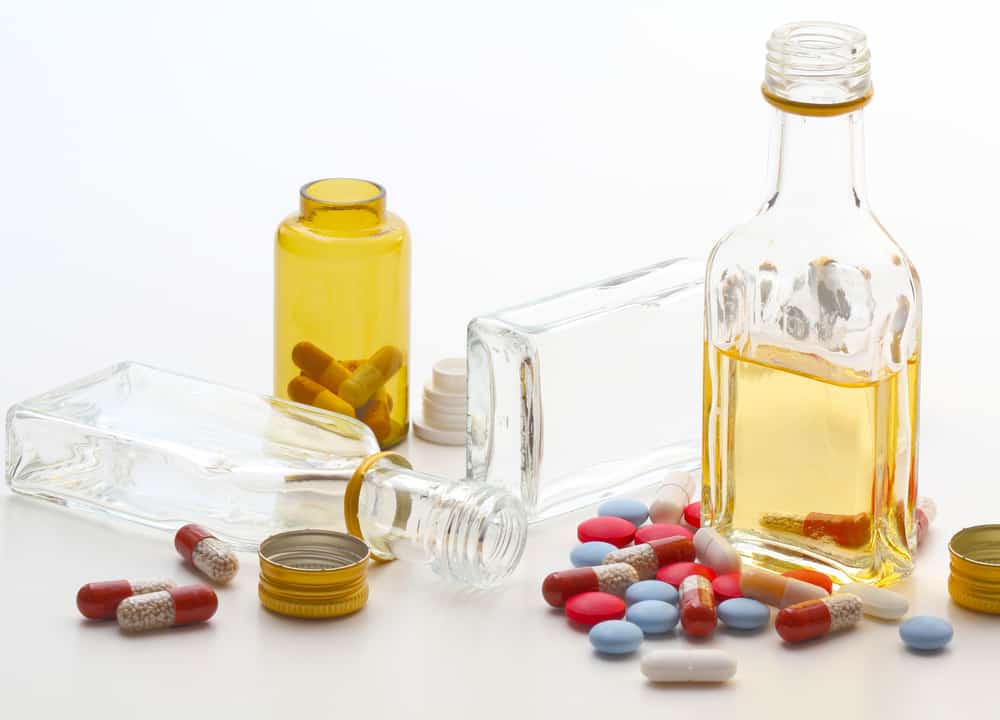
When I quit drinking and went to rehab, I wanted to know if any medications for alcoholism had been shown to help people cut down on alcohol or stay abstinent.
My counselors informed me that no such things existed. They said that AA was the only way to heal.
They were wrong, and this article will illuminate this issue in case you’ve found yourself in my former shoes.
Now, you might be wondering…
Why would I spend time writing about medications for alcoholism when I’m passionately opposed to the “pill for an ill” mentality?
Alcoholism is a brutal biochemical disorder and all options need to be on the table. With that said, everyone responds differently to medications.
Medications for alcoholism are not necessary for everyone. But if you are someone who has tried to quit drinking again and again, the information in this article could be a lifesaver.
I did not use drugs to beat alcohol addiction. But I do wish my doctor had informed me about all of my options. Especially given the 90% relapse rates that plague the mainstream rehab industry!
While alcohol benzodiazepines for alcohol withdrawal are widely prescribed, few people know about medication for alcohol cravings that might help them get past post-acute withdrawal syndrome (PAWS).
This list is not arranged in any particular order. Be sure to discuss these options with your doctor before taking any medications. And if your doctor knows nothing about this subject, get a better informed doctor!
Why Don’t We Hear About Medications For Alcoholism?
If you had diabetes, you’d probably be confused if your doctor failed to tell you about insulin and recommended a diabetes support group instead. There actually are diabetes support groups, and they probably help people. But you’d expect a medical expert to tell you about your medical options first.
Why aren’t people informed by doctors about all of the medications above?
First, our society sees alcohol addiction as a primarily spiritual matter. The assumption among doctors is that “alcoholics” will heal through AA, even though it has a 90% failure rate.
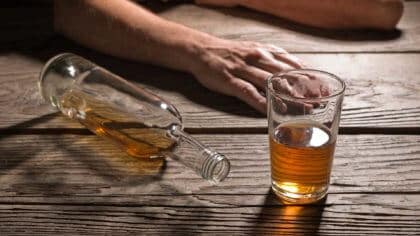
A few older drugs have now been proven to help alcoholics, but their patents have expired. Drug companies have no interest in promoting them for alcoholism.
There’s a lot more money in more socially acceptable pills for an ill – ADD medications for kids, statins for overeaters, and antidepressants for virtually everyone.
Since doctors receive most of their continuing education from pamphlets and seminars provided by drug companies, many of them have no idea how to prescribe medications for alcoholism.
I could go on about the confluence of anti-science groupthink and our broken medical establishment. But my purpose here is to inform you about medications that you might not otherwise hear about.
Medications For Alcoholism #1 – Naltrexone
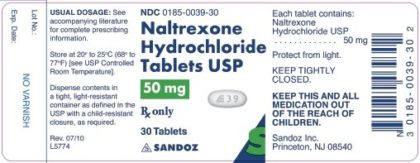
Naltrexone hydrochloride is a medication that has been approved by the FDA to treat alcohol addiction since 1994.
Naltrexone is a opioid antagonist, meaning that it plugs the same brain receptors as opiates and endorphins. Endorphins are the brain’s natural pleasure chemicals.
Instead of producing pleasurable effects, naltrexone sits in the receptor site and simply blocks pleasure chemicals from entering. Naltrexone therefore prevents drinkers from feeling pleasure when they drink.
Naltrexone taken along with abstinence shows only a small reduction in relapse rates. Naltrexone works slowly over time – but only if it is consumed every time that person drinks alcohol.
This process is called pharmacological extinction. Drinkers who use this method take naltrexone before drinking for the rest of their lives to prevent rekindling their alcohol addiction. Many people who use this method voluntarily decide to quit drinking entirely.
Rehab centers in Norway and other parts of Europe use naltrexone with success rates of up to 80%.
Naltrexone for alcohol addiction is well-established in the scientific literature:
- A 1997 study found that when naltrexone was combined with therapy, only 35% relapsed, compared to the treatment industry standard of up to 90% relapse (source)
- In a 6 month double-blind, placebo-controlled study with 118 alcoholics, naltrexone was associated with significantly fewer heavy drinking days than the placebo (source)
- Out of 14 clinical trials conducted through 2001, only two failed to demonstrate the efficacy of naltrexone for alcohol disorders (source)
Medications For Alcoholism #2 – Baclofen
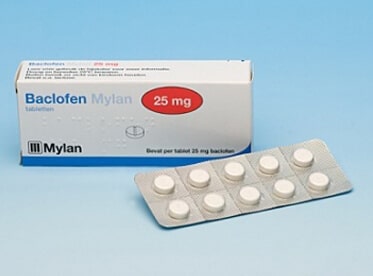
The use of baclofen for alcoholism was popularized by a French-American cardiologist named Olivier Ameisen. Dr. Ameisen successfully tested this drug on his own addiction before pioneering its use.
Baclofen is a nervous system depressant and a muscle relaxant. It is widely prescribed for spasticity disorders. It has been proven to be very effective for alcohol-dependent people who are deficient in GABA.
Baclofen stimulates GABA receptors in a similar way as benzodiazepines. In contrast to these powerful drugs, significant dosage tolerance to baclofen does not build up over time.
Unfortunately, baclofen is an old generic drug that cannot be patented. There is no incentive for American drug companies to spend money on clinical trials. However, tens of thousands of Europeans – including 50,000 in France alone – take high-dose baclofen for alcohol addiction.
The effectiveness of baclofen for alcohol withdrawal and alcohol cravings is now well-established in the scientific literature:
- In a two-year study of 100 patients, long-term baclofen treatment caused an effortless decrease of alcohol withdrawal and post-acute withdrawal symptoms (source)
- In a 12-week study of 56 alcoholic patients receiving either high dose baclofen or a placebo, 68% of those given baclofen remained abstinent, compared to 23% on the placebo (source)
Medications For Alcoholism #3 – Gabapentin
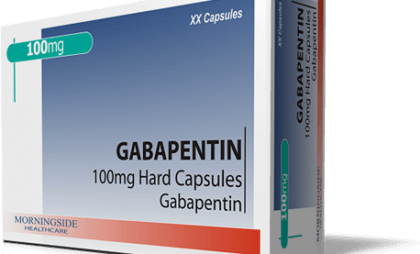
Gabapentin is typically sold under the brand name Neurontin. It is an anticonvulsant medication that works by increasing the production of GABA in the brain. In alcohol-dependent people, brain cells are often too damaged to perform this crucial function.
Some people use gabapentin for alcohol withdrawal and then taper off to avoid dependence. Others take gabapentin over the long-term for alcohol cravings. Continuing to use gabapentin after alcohol detox has helped many people reduce the chance of relapse.
Gabapentin is not an FDA-approved medication for alcoholism. It is often prescribed to alcoholics off-label.
A number of studies support the use of gabapentin for alcohol withdrawal and cravings:
- In a 12-day study of alcoholics detoxifying with either gabapentin or lorazepam, the gabapentin group was less likely to drink – and had less craving, anxiety, and sedation (source)
- In a 12-week study of 150 alcoholics receiving either gabapentin or a placebo, the gabapentin group had significantly less insomnia, dysphoria, and alcohol craving (source)
- Gabapentin reduced alcohol intake for alcoholic rats but not for non-alcoholic rats, demonstrating its effectiveness for alcohol cravings by acting as a substitute source of GABA (source)
Medications For Alcoholism #4 – Acamprosate
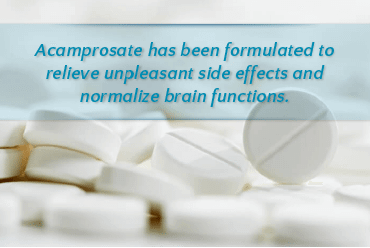
Acamprosate is FDA-approved to help alcoholics manage post-acute alcohol withdrawal syndrome. It is usually sold under the brand name Campral.
Acamprosate may ameliorate post-acute withdrawal syndrome. It has a notable impact on anxiety and alcohol cravings. It does this by stabilizing brain chemicals involved in alcohol withdrawal.
Specifically, it is thought that acamprosate reduces glutamate activity in the brain.
Acamprosate is typically prescribed for 3-12 months following acute withdrawal. Acamprosate relieves the intense sensation of stress that leads many alcoholics back to the bottle.
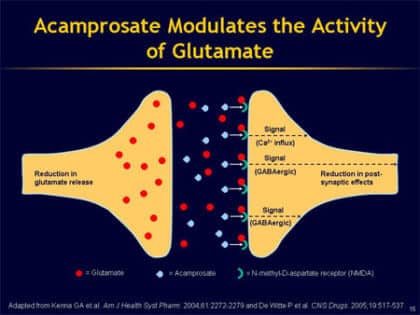
Acamprosate had been used with success for decades in Europe before it was approved in the U.S.
- A critical review of acamprosate alcohol treatment studies found that acamprosate increases abstinence rates, reduces treatment costs, and produces superior results compared to group support alone. (source)
- A comprehensive meta-study of 17 trials consisting of 4,087 patients from 13 countries found that 36% of individuals receiving acamprosate alcohol treatment and 23.4% of individuals receiving placebo remained abstinence at 6 months. (source)
- In a one year study of alcoholics in real-world conditions, 540 individuals who received acamprosate alcohol treatment were found to have a 33.6% abstinence rate compared to 21.6% for 274 individuals who received only psychosocial support. (source)
Medications For Alcoholism #5 – Topamax
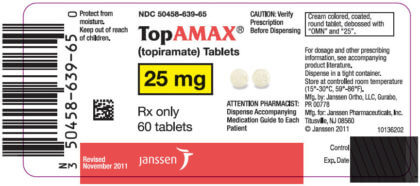
Topamax (topirimate) is an anticonvulsant and anti-epileptic medication that has powerful neuro-protective properties. It is not among the FDA-approved medications for alcoholism, but it has shown great promise.
Topamax works by balancing GABA and glutamate levels. It also removes excess dopamine that is released by alcohol. As a result, heavy drinkers who consume both Topamax and alcohol drink significantly less.
Topamax can help people who are still drinking. People can use Topamax for a short period to reduce withdrawal or for a longer period to help avoid relapse.
The patent for Topamax expired long ago. There is no financial incentive for drug companies to pursue approval to market Topamax for alcohol addiction.
A number of studies support the use of Topamax for alcohol withdrawal and cravings:
- Detoxing alcoholics who received up to 75 mg of Topamax had fewer alcohol withdrawal symptoms in the 7-10 days following drinking cessation, and significantly fewer relapses in the 4 weeks following treatment, than patients who received only therapy (source)
- In a 4-week study with 371 participants, half receiving placebo and the other half receiving Topamax, the Topamax group had significantly fewer drinking days (source)
- Low dose Topamax reduces alcohol cravings, anxiety, and depression during acute withdrawal (source)
Medications For Alcoholism – Conclusion
Medications for alcoholism may not work for everyone, but the failure to beat alcoholism can be fatal. I believe that you deserve to know about every option out there.
If you’re suffering from severe alcohol addiction (as I once did), it’s very important to find a doctor who can advise you about treatment options. Send this article to him or her, and then schedule a conversation.
If you’re lucky enough to be stuck with mild to moderate alcohol dependence, you will probably not need medications. The articles here on Elevation Recovery can make your life MUCH easier going forward!

This presentation was extremely informative. I will file it away for implementation as needed. This information should be available to sufferers who are inclined to seek help from a physician. Being informed paves the way to getting the help they need!
Thanks for the feedback! We appreciate your comment.